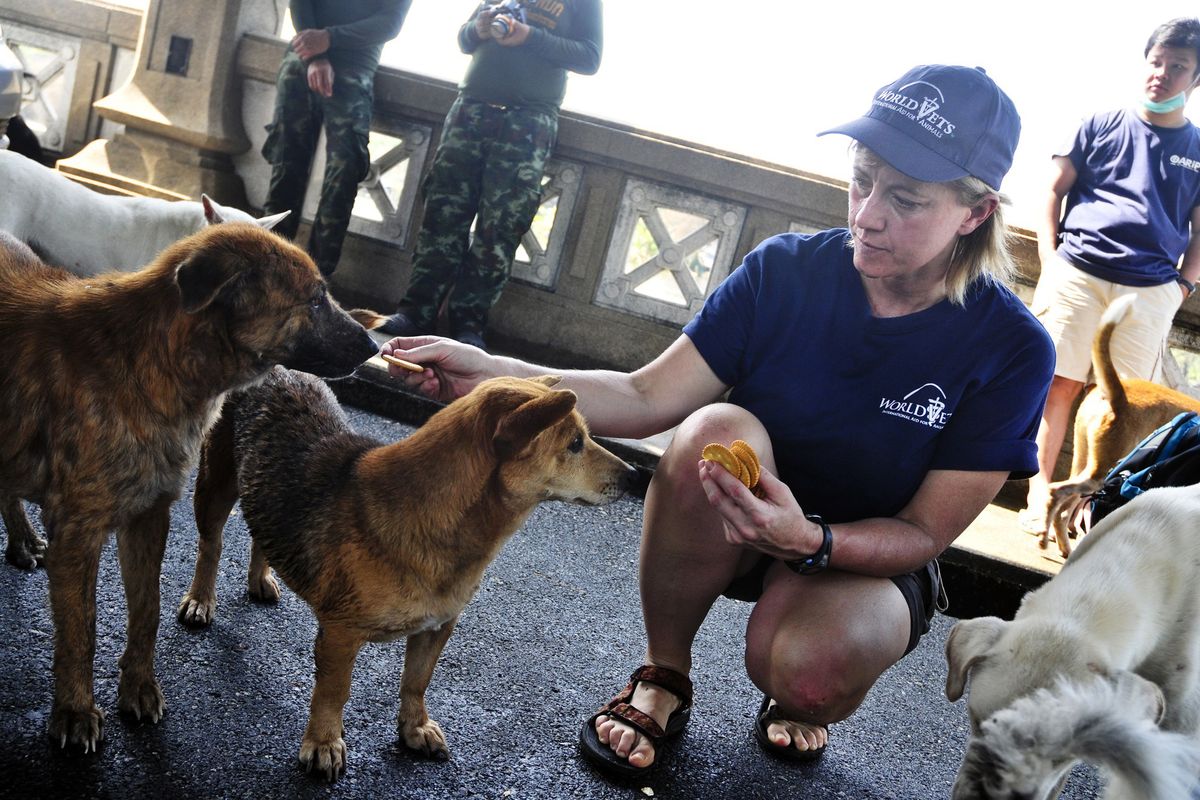Serving, saving animals
World Vets volunteers have served in 36 countries

Cathy King started World Vets in 2006 with a donation jar at her veterinary office in Deer Park.
Today, the nonprofit’s volunteer veterinarians have treated animals in 36 countries, from flood-ravaged Thailand to low-income neighborhoods in Central America.
“It’s really a concrete thing that we have changed so it’s so rewarding,” said King, whose nonprofit is now headquartered in Fargo, N.D. “We are providing veterinary care in developing countries and disaster relief worldwide.”
King founded World Vets after she witnessed the Mexican government killing stray dogs by lacing meat with poison and stringing the bait throughout city streets.
“I thought, gosh, there are probably other veterinarians who would care and volunteer to help with this,” she said.
In places like Ecuador and Romania, World Vets has established agreements with local governments to end the killing of stray animals. In return, the nonprofit helps prevent pet overpopulation through free spay-and-neuter missions.
That international outreach has been a founding principle of the nonprofit, which estimates it will receive $2 million in donations this year, about half of which is in-kind giving, such as veterinary medicine and equipment. The donations have helped fund about 20 international rescue trips a year, and more than 3,500 people have volunteered.
King, a graduate of Washington State University’s College of Veterinary Medicine, has also maintained close contacts with the university’s faculty and graduates. Veterinary students there often participate in World Vets projects, said Mushtaq Memon, WSU’s international veterinary associate professor, who taught King during her graduate studies.
Memon said King’s nonprofit “is not only one of the most well-known in the country now but maybe in the world.”
For example, in Thailand last month, World Vets responded to flooding that stranded thousands of animals. Volunteers found starving dogs waiting atop waterlogged cars and floating tabletops in the flooded streets of Bangkok.
The volunteers arrived in Thailand on Nov. 10 with more than $20,000 in veterinary supplies to treat and transport an estimated 60,000 street dogs to drier lands in Cha-am, a dry area three hours south of Bangkok.
“The most rewarding part is, of course, the animals in whose lives I was able to make a positive difference,” veterinarian Karen Allum, a WSU graduate who volunteered in Thailand, said in an email.
In addition to the rescue, Allum said her team neutered 150 male dogs and spayed 60 female dogs during her 10-day effort in Thailand.
“My brief time in Cha-am was exhilarating,” wrote Allum, who owns a veterinary practice near Philadelphia. “I have never before seen so many veterinary volunteers from multiple organizations working toward a unified goal. …”
Allum said she encountered two anemic puppies, feverish and dying of an infectious disease transmitted by a tick bite. The infection causes symptoms similar to the flu, but the puppies recovered with IV fluids and medications, she said.
Any certified veterinarian can volunteer for a World Vets project with a membership through the nonprofit’s online website. The trips also are open to technicians and students, but all volunteers are asked to cover their own expenses, which average about $2,500 per person.
Randy Walling, a WSU veterinary student, said it is good that the donations go to the animals instead of trip fees. Walling was one of 22 volunteers who traveled to Roatan, Honduras, last spring to spay and neuter dogs. He said the purpose was to keep the dog population from increasing, but to do it in a humane way.
The volunteer teams perform everything from rescuing and neutering to delivering offspring and treating pet cancers.
World Vets also collaborates with the U.S. Navy to provide international veterinary services in developing countries. That includes vaccinations and de-worming campaigns, educational talks, and work directly with animals.
“Part of the mission’s goal is to build diplomacy and the other part is for the Navy to build a partnership with nonprofit organizations,” King said.
In September, World Vets developed the International Veterinary Medicine Program in Granada, Nicaragua, to teach students there crucial skills within the veterinary field. The program will launch next summer and be taught by World Vets staff, including American and Nicaraguan veterinarians.
“The whole program itself has evolved so much,” said Kala Fagan, a WSU pre-veterinary student who traveled to Mongolia with the group last summer. “When I found it (five years ago), it was just a tiny, one-page website. Now they’re worldwide.”